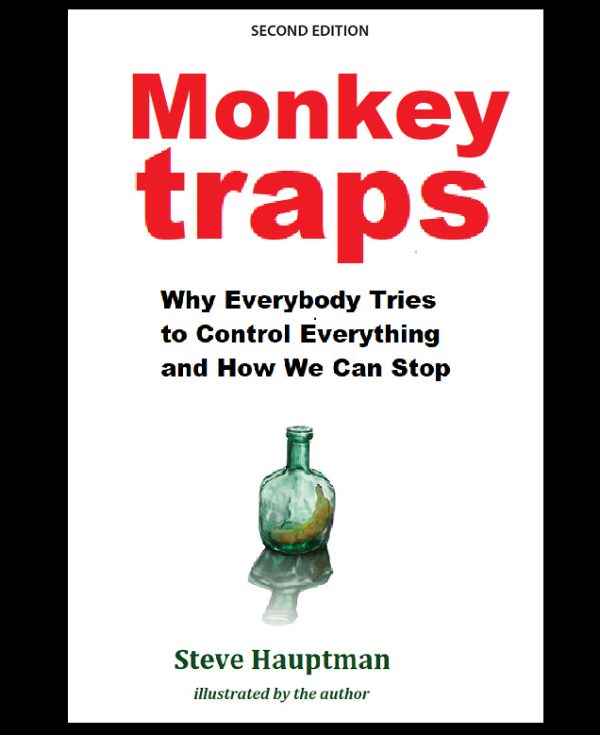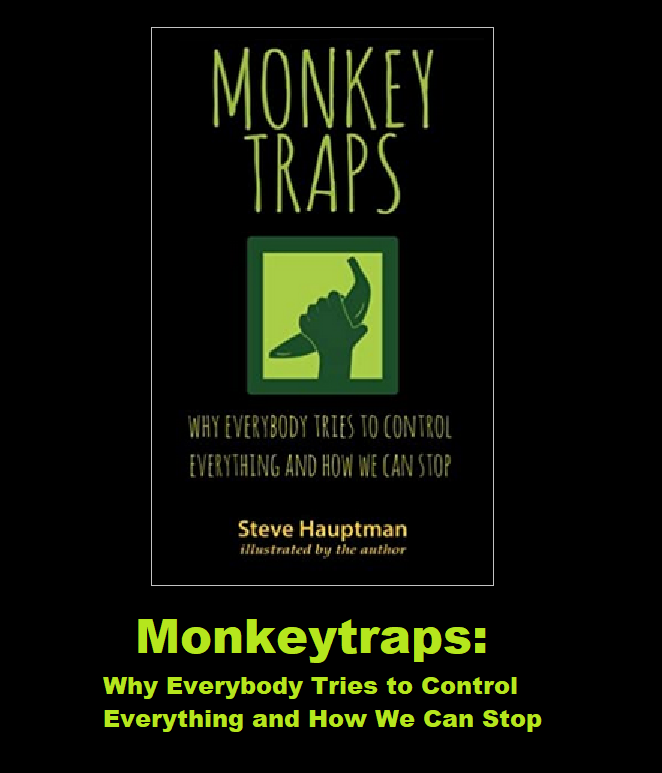 (If you’re new to Monkeytraps, Steve is a therapist who specializes in control issues, and Bert is his control-addicted inner monkey.
(If you’re new to Monkeytraps, Steve is a therapist who specializes in control issues, and Bert is his control-addicted inner monkey.
That’s Bert at left, before being mom-wounded.
Steve speaking:)
First of four parts
Twenty years of doing therapy with men has led me to three conclusions about us as a psychological species.
First:
Most of us don’t feel like men at all. Secretly, we feel like boys.
Second:
This feeling is more or less inevitable, given how we are socialized.
Third:
We’re all bleeding from the same four emotional wounds.
The wounds are losses. Most of us spend our lives trying to recover from them. Most, it seems to me, spend our lives failing.
What follows is a four-part attempt to describe these four wounds and how they drive the controlling behavior of the members of my species.
The mom-wound
Men lose their moms in a way women don’t.
Most of the women I know seem to retain emotional connections to their mothers that their brothers and husbands have not.
Why? Because at some point most men conclude that they can’t stay too emotionally attached to their mothers if they want to become real men. (Whatever that is.)
So we cut ourselves off from Mom, emotionally and psychologically, often even while living under her roof.
In so doing we leave behind not just our personal mothers, but all that mothering itself represents: nurturing, caring, affection, gentleness, kindness, empathy.
We leave all that behind to enter the world of men, the world of hunters and soldiers and workers and other big boys who don’t cry.
This damages us in three ways:
~ It splits us in two, forcing us to disown our own capacity for feeling, our own feminine side.
This split sets us off on the familiar but dismal path of self-ignorance and emotional starvation that has been described as “the old paradigm”:
Don’t feel. Die younger than women. Don’t talk. Don’t grieve. Don’t get angry. Don’t rock the boat. Don’t trust other men. Don’t put passion before bill paying. Follow the crowd, not your bliss.*
~ We become terrified of feelings themselves — which, should anyone discover them in us, might expose us as being too feminine.
As a result, our emotional lives come to be governed by fear. Every man I know is secretly scared shitless of being perceived (or, worse, perceiving himself) as not Man Enough.
Often we defend against this fear by overcompensating in the opposite direction. We become hard, rigid, controlling, stubborn, insensitive, sometimes even abusive or violent.
We may use sex as a means of achieving status or exploiting women rather than expressing love, tenderness or vulnerability.
We may scorn emotional men as “wimps,” “bleeding hearts” or “gay.”
Some of us may even mock or abuse homosexual men, just to prove just how un-gay we are.
Finally, because denying needs doesn’t make them go away (just drives them underground),
~ We transfer our emotional needs to the women in our lives.
Wives, girlfriends, daughters, female friends — we expect those women to heal our wounds, to make up for what we’ve sacrificed.
We do this, for the most part, unconsciously. As a result neither we nor the women really understand what’s going on between us or why our relationships are so frequently disappointing.
Though women certainly sense it. At some point in nearly every marriage therapy I’ve ever done the wife exclaims in frustration, “He feels more like my son than my husband.”
Confusion, frustration, hurt and rage on both sides are common.
Many men end up disappointed with and resentful towards the women in their lives without really knowing why.
Many woman end up feeling both inadequate and betrayed at the same time.
And if it goes unacknowledged and untreated too long, the man’s mom-wound can become the invisible rock upon which his relationship gets wrecked, sometimes fatally.
Next: The dad-wound
___________________
~ John Lee, At my father’s wedding.
* * *
Want more?
Men are more likely to confess to a predilection for pornography than admit to a close relationship with their mother. There isn’t much left that the modern man is made to feel ashamed of, yet confessing to your friends that you sometimes call your mum for a chat is something few do. Even though a man’s mother is likely to be the second most important woman in his life, even though he may have deep feelings of love for her, this is a relationship about which men are sheepish, secretive and often outright embarrassed.
From “Men and their mothers: What’s it all about?” by William Sutcliffe, The Sunday Times.







September 18th, 2011 at 9:47 pm
Well, dang, Steve, You never even met my ex-husband, yet you described him perfectly…Good Job!
September 18th, 2011 at 9:53 pm
Thanks, Ruth. 🙂
September 19th, 2011 at 7:19 am
uhg, having trouble with this one, one thing at a time, Right?
September 21st, 2011 at 9:47 am
[…] Last time I wrote about three conclusions I’ve reached from doing therapy with men, namely […]
August 11th, 2017 at 6:36 am
Thank you. Illuminating for women. Have you written on boys/teenagers who were abandoned by moms.
August 11th, 2017 at 8:35 am
Sorry, no. Though I can relate personally.